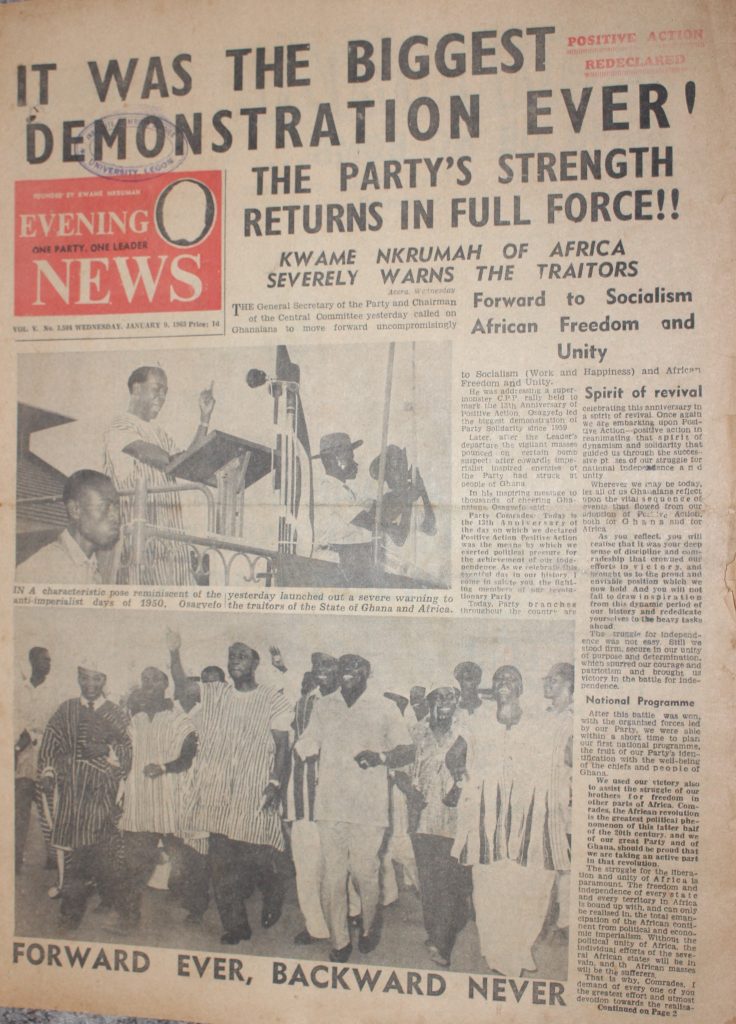Schooling the nation through words: reading and writing in the Non-European Unity Movement, 1940s-1950s The production and circulation of newspapers, periodicals and pamphlets by members of the Anti-CAD, All-African Convention and the Non-European Unity Movement (as well as the Teachers’ League of South Africa and the Cape African Teachers’ Association) during the 1940s and 1950s […]
Featured
Journals
From 1971 to 1973, the nascent grassroots political organization known as Kokua Hawaii independently published and distributed Huli, a semiregular newspaper featuring radical economic analysis, community news, organizing strategies, political education, social documentary photography, and illustrated agitprop graphics. Kokua Hawaii, based on Oʻahu and active across the Hawaiian islands, was influenced by legacies of militant […]
Published first in December 1969, Black Land News formed the propaganda arm for the Black Land Movement (BLM) and its youth wing the Young Pioneers of New Africa (YPNA). Through their newspaper, published initially on a monthly basis and later shifting to biweekly, BLM sought to foster the rise of an independent Black nation from […]
La Ruche, Surrealist Antifascism and the 1946 Haitian Revolution La Ruche, ‘Organe de la jeune génération,’ Journal Hebdomadaire Littéraire et Social, began in late 1945 as a cultural, literary and political revue produced by left-militant youth would go on to become some of Haiti’s most important intellectual and political actors. Members of La Ruche, such […]
Historical connections in the Global South: W.E.B. Du Bois and the Cuban Anti-racist struggle for Democracy This paper reconstructs the connections between Du Bois and Cuban intellectuals within global south struggles for anti-racist democracies. The first section shows how Du Bois connections with Cuba occurred both at the level of intellectual collectives and through interpersonal […]
Translating the Revolution, Imagining Independence in Tunisia: Perspectives Tunisiennes and al-‘āmil al-tūnsī (1963-1974) Tunisia’s post-French colonial era was dominated by the political and social imagination of the one, President Habib Bourguiba, and his vision for a bourgeois colonial modernity. The most resilient voice of opposition (political and cultural) came from university campuses, and a nebulous […]
Savera, a left-wing literary magazine published quarterly in Lahore, Pakistan from 1946 … read more
The Evening News: Where Thought and Action Converge The Evening News was established by Dr. Kwame Nkrumah and the Convention People’s Party in 1948 and served as a vehicle to expose Ghanaians and Africans to Pan-African Consciousness. As the mouthpiece of the CPP, the paper spoke directly to three main constitutes‒members, the public and fellow […]
‘Overthrow the capitalist system of Government and usher in a co-operative Commonwealth one’: the Industrial and Commercial Workers’ Union of Africa (ICU), the Workers’ Herald, and dreams of revolution, 1923-1929. Abstract: The Industrial and Commercial Workers’ Union of Africa (ICU) and its charismatic leader Clements Kadalie dominated the Southern African political landscape of the 1920s. […]
The Popular Front for the Liberation of Palestine (PFLP), an armed Marxist-Leninist Palestinian national movement, used its weekly Arabic-language organ, al-Hadaf (The Target), to demonstrate its revolutionary analytical acumen on a variety of topics, including contemporary international affairs, political theory, Zionism, and women’s liberation. However, in addition to this rich spectrum of subjects, al-Hadaf always […]
APSI (Agencia de Prensa y Servicios Informativos) was a news magazine focused on international issues. Its origins can be traced back to 1976, during the Chilean dictatorship. The magazine circulated in the Spanish language in Santiago de Chile, and as its success grew, it expanded to other cities. It was not until 1982 that it […]
The Negro World was a newspaper published in Harlem, New York between 1918 and 1933. It was the paper of UNIA, the Universal Negro Improvement Association, founded by Marcus Garvey in 1914.
Teaching Tools
Digital resources for teaching and learning about revolutionary periodicals.

Mapping the Social Lives of The Namibian Review

Sawt al-Thawra: A Counterarchive of the Dhufar Revolution
















